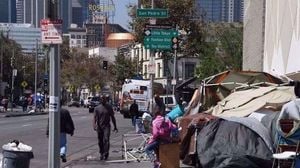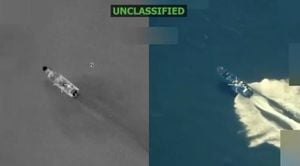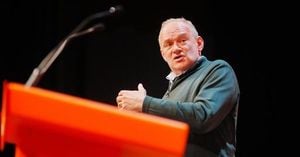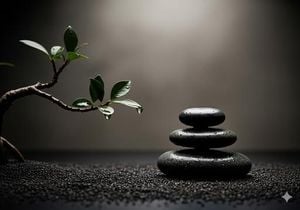Two blocks from the official residence of Israeli Prime Minister Benjamin Netanyahu, where the streets of Balfour and Gaza meet in West Jerusalem, the air was thick with news and uncertainty on September 21, 2025. Inside a small, unnamed corner café, the usual mid-morning hum was interrupted by a flurry of phone notifications: United Kingdom Prime Minister Keir Starmer had just announced the formal recognition of a Palestinian state. As patrons glanced up from their coffees, some shrugged, others grumbled, but all seemed to sense that something significant was unfolding—even if the immediate impact felt remote.
This move by the UK, as reported by AFP and Dow Jones, was not an isolated gesture. Australia and Canada quickly joined in, issuing their own recognitions in what appeared to be a coordinated diplomatic maneuver. The timing was no accident: these announcements came just a day before a special United Nations General Assembly summit on the war in Gaza, an event organized by France and Saudi Arabia to rekindle the long-stalled two-state solution.
For many in Israel, the news was met with a mixture of anger, skepticism, and resignation. Shira Hazan, a 55-year-old shop owner and longtime supporter of Netanyahu’s Likud party, voiced a sentiment shared by many in her circle: “Of course I’m angry. But what changes? Britain doesn’t bury our soldiers. It’s just politics while Iran is shooting at us.” Nearby, another café regular dismissed the development as “colonial arrogance, nothing less,” barely glancing up from his phone.
Yet, the symbolism of the UK’s decision is hard to ignore. As AFP noted, this is the first time a major Western power that once held the Mandate for Palestine—a responsibility handed to Britain by the League of Nations after World War I—has formally recognized Palestinian statehood. This historical resonance, coming from the very country that played a pivotal role in shaping the modern Middle East, added gravity to the move.
Australia’s Prime Minister Anthony Albanese explained the decision as an effort “to acknowledge Palestinians’ aspirations for statehood and to revive the two-state solution,” a sentiment echoed by the UK government, according to Dow Jones. The hope, at least among Western leaders, is that such recognition might help breathe new life into peace efforts after nearly two years of devastating conflict in Gaza.
But in Israel, the reaction was swift and polarized. Far-right National Security Minister Itamar Ben-Gvir wasted no time in framing the recognition as a threat. He declared his intention to push for “immediate annexation of the occupied West Bank,” describing the recognition as “a prize for the murderous Nukhba terrorists,” referencing the Hamas unit that led the October 7, 2023, attack in southern Israel. Ben-Gvir vowed to propose “the complete dismantling of the ‘Palestinian’ Authority” and to submit a plan for applying full Israeli sovereignty in the West Bank at the next cabinet meeting.
The Hostages and Missing Families Forum, a group that has kept vigil outside Netanyahu’s home for more than 740 days, condemned the international recognitions. They decried “the unconditional recognition of a Palestinian state while turning a blind eye to the fact that 48 hostages remain in Hamas captivity.” Their frustration was echoed by centrist opposition leader Benny Gantz, who warned that the move would only “embolden Hamas, extend the war, distance the prospects of a hostage deal, and send a clear message of support to Iran and its proxies.” In a pointed message to Western leaders, Gantz wrote, “If advancing peace & stability in the Middle East is what you seek, dear Western Leaders—and not buckling to domestic political pressure—then maximum pressure must be applied to Hamas to relinquish power and return the hostages before anything else.”
Not all Israeli voices were opposed to the recognitions. Ofer Cassif, a left-wing parliamentarian who had previously supported South Africa’s genocide case against Israel at the International Court of Justice, called Starmer’s move “a step in the right direction.” Speaking to Al Jazeera, Cassif argued, “Recognition is a crucial first step toward a just peace, and all other countries that have not yet done so should follow suit. But it must not become an end goal by itself. A complete arms embargo on Israel must follow, until the government of death and destruction ends the genocide in Gaza and dismantles the illegal occupation of the Palestinian territories.” Cassif also expressed support for a UN peacekeeping force and for reactivating anti-apartheid measures once used against South Africa.
Other Israelis, even those who support a two-state solution, questioned the timing of the announcements. Noam Achimeir, a 29-year-old PhD candidate at Hebrew University, said, “Look, I believe in two states, I’ve marched for peace; I’ve argued with my parents about the occupation for years. But this? This is the absolute worst moment. We’re under missile fire, families are hiding in shelters, and people are still held hostage. When countries make a grand gesture right now, it feels like rewarding the people doing that to us.” Still, he conceded, “Maybe it’s symbolic. But symbols matter. If Britain recognises Palestine, maybe it forces us to admit this conflict won’t just vanish.”
On the opposite end of the spectrum, Eliyahu Korenman, a religious Zionist from the settlement of Shilo, saw the recognitions as a green light for Israel’s enemies. “London’s decision tells Hamas, Hezbollah, Iran to keep firing rockets, holding hostages, killing Jews—and the world will reward you,” he said. “Every Israeli knows Palestine is just another word for surrender.” Yael Ben Eshel, a 27-year-old Likud voter, was more dismissive: “Honestly? Who cares? Britain hasn’t mattered here in decades. They can recognise Palestine, they can recognise the moon, it changes nothing on the ground.”
The recognitions came amid mounting tension and violence. The Israeli army had just deployed a third division into Gaza City as part of an operation called “Gideon’s Chariots B,” expanding a months-long offensive that has killed hundreds and led to famine declarations in the enclave. Meanwhile, Israel’s hard-right government, led by Netanyahu, continued to take steps to block any path to Palestinian statehood. In the week before the recognitions, Minister of Finance Bezalel Smotrich unveiled a plan to annex 82 percent of the occupied West Bank, and Netanyahu himself signed a controversial agreement to expand settlements, reiterating, “there will be no Palestinian state; this place belongs to us.”
As the international community weighs in, the debate over Britain’s historical role in shaping the region resurfaced. Achimeir criticized the UK’s legacy, saying, “Britain set the stage. First, it promised Arabs freedom if they fought the Ottomans, then secretly carved up the region in Sykes-Picot. It told Jews one thing in the Balfour Declaration and told Arabs another.” Daniel Darby, an anti-Zionist from Pardes Hanna, argued that recognition alone is meaningless without concrete action: “The UK will not clear its past and its responsibility unless it takes action now, with a full weapons embargo and full sanctions on the state of Israel.”
With France, Belgium, Luxembourg, and Malta expected to join the growing list of countries recognizing Palestinian statehood, and more than 145 UN members already on board, the diplomatic landscape is shifting rapidly. Whether these recognitions will lead to meaningful change—or simply deepen existing divides—remains to be seen. For now, the streets of Jerusalem and the halls of international diplomacy are abuzz with questions, hopes, and a fair share of skepticism.




